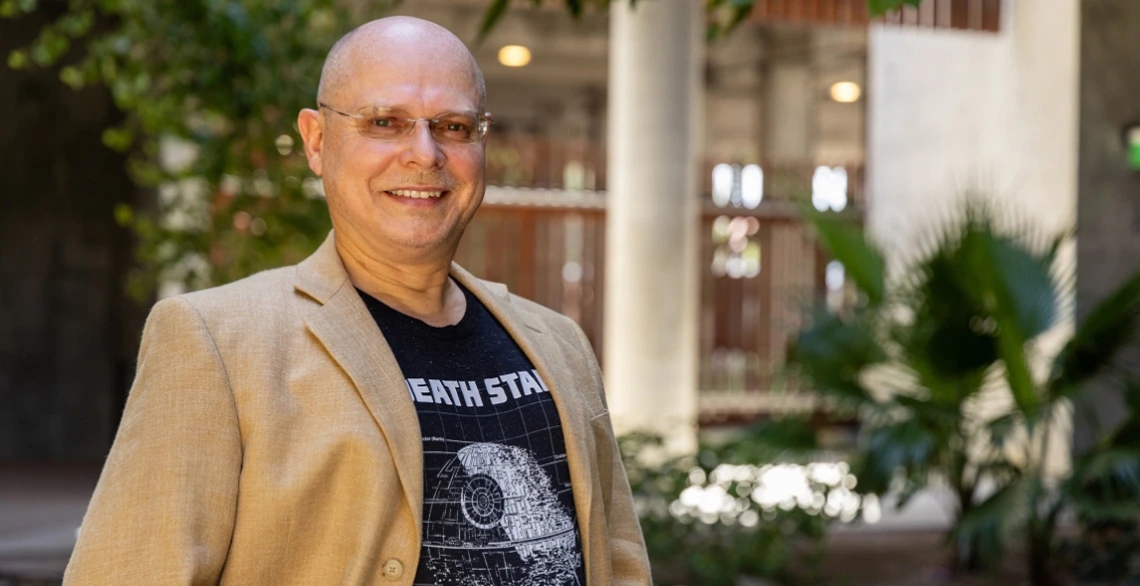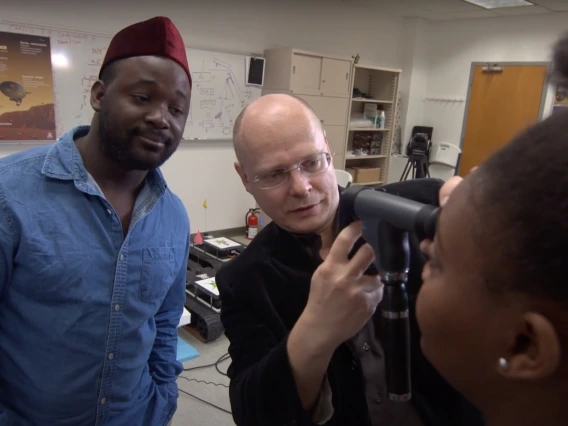National Academy of Inventors Elects Two Engineering Professors
Douglas Loy and Wolfgang Fink are advancing technology in areas ranging from additive manufacturing to eyesight health care.

Several of Wolfgang Fink's inventions are likely to make their way into health care settings.
The National Academy of Inventors elected two University of Arizona Engineering faculty members to its 2023 Class of Fellows – Douglas Loy, professor of materials science and engineering, and Wolfgang Fink, professor of electrical and computer engineering and biomedical engineering.
Only academic inventors who have made significant contributions to improving quality of life and bettering society are eligible for NAI’s highest professional honors. Both prolific inventors, Loy is known for products including a bio-based sunscreen, and Fink has created several health-related innovations and autonomous systems.
“Dr. Fink and Dr. Loy are each impressive representatives of the university within their fields, and I am proud to see them recognized,” said University of Arizona President Robert C. Robbins.
Douglas Loy: Progress With Polymers
Loy was a member of research teams at Sandia National Labs and Los Alamos National Lab prior to joining the Department of Materials Science and Engineering in 2005.
His research has contributed to polymer synthesis and sol-gel science for producing solid materials from small molecules. He has published 126 peer-reviewed papers, is on the editorial board for the journal Molecules, and is a member of the American Chemical Society, the Materials Research Society, the Association for the Advancement of Science, and Sigma Xi. He was recognized with Tech Launch Arizona’s Inventor of Year Award for the Physical Sciences in 2017.
Loy, who is also a professor with the BIO5 Institute with a joint appointment in chemistry and biochemistry, holds 25 U.S. patents and has an additional 10 in process. He is a co-founder of Energy Materials Corp., which produces fuel cell membranes that operate at maximum temperatures and higher ion conductivity. Their chemistry allow them to operate with technical-grade hydrogen.
Honeywell licensed his patents for removable epoxies, polyurethanes and thermosets, the latter of which are plastics formed when multiple components chemically react under ambient conditions to form hard, rigid materials. His other patents cover applications ranging from processes for breaking down surfactants and adhesives to technology for creating long-lasting polymer-based sunscreens, which has been licensed to Mexico-based Novamex.
“This is a great honor and recognition of the incredible creative research groups I have had the privilege to lead,” said Loy.
Along with his prolific research and invention efforts, Loy mentors 50 undergraduates, 22 graduate students and 18 postdoctoral associates. Loy is well-known for producing new polymers for additive manufacturing. During the COVID-19 pandemic, he worked with a group of undergraduate and graduate students, as well as faculty, to design, 3D-print and test medical masks in response to a shortage.
Wolfgang Fink: Health and Autonomous Systems
Fink is the inaugural Edward and Maria Keonjian Endowed Chair, with joint appointments in the Departments of Electrical and Computer Engineering, Biomedical Engineering, Systems and Industrial Engineering, Aerospace and Mechanical Engineering, and Ophthalmology and Vision Science.
“This honor not only recognizes my research innovations,” said Fink, “but, even more so, reminds us of the critical importance of innovation and entrepreneurship in a university setting.”
Fink joined the UA faculty in 2009 from NASA's Jet Propulsion Laboratory/Caltech. His work focuses on biomedical engineering for health care, specifically on ophthalmology and vision care; human/brain-machine interfaces such as artificial vision implants; smart platforms for mobile and telehealth; and autonomous systems, such as those for robotic space exploration.
Fink has invented, prototyped and is commercializing numerous technologies. His patented inventions include visual prostheses for the blind; implantable devices to monitor pressure in the eye for glaucoma therapy; and a smartphone-based pupillometer to assess brain injuries and sleep apnea.
He has over 265 publications, six NASA patent awards, five awards from Tech Briefs magazine, 23 U.S. and six foreign patents, along with 10 patents pending in biomedical devices, neural stimulation, micro-electro-mechanical fabrication, data fusion and analysis, autonomous systems and multi-dimensional optimization.
Official Welcome Into an Esteemed Circle
Senior officials with the U.S. Patent and Trademark Office will present medals to the 2023 Class of Fellows at the NAI Annual Meeting in June 2024 in Raleigh, North Carolina.
The class hails from 118 research universities and governmental and nonprofit research institutions worldwide. Collectively, the 2023 fellows hold over 4,600 issued U.S. patents. Since its inception in 2012, the NAI Fellows Program has grown to include 1,898 exceptional members who hold over 63,000 U.S. patents and represent 13,000 licensed technologies. Their innovations have generated over $3 trillion in revenue and generated 1 million jobs.



